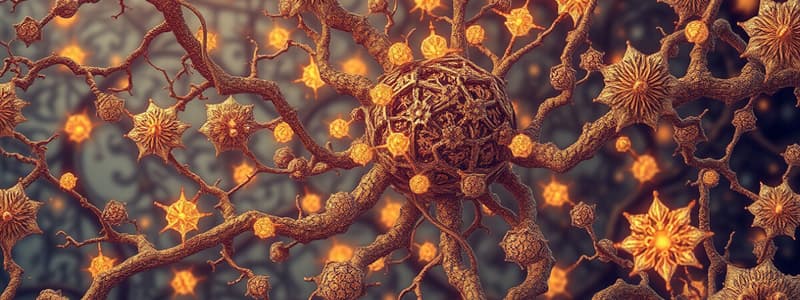Podcast
Questions and Answers
What are the classes of neurotransmitters?
What are the classes of neurotransmitters?
Acetylcholine, Amino Acids, Biogenic Amines, Neuropeptides
Where is ACh found?
Where is ACh found?
Large pyramidal cells from the motor cortex, neurons in basal ganglia
What neurotransmitter is involved in short-term memory?
What neurotransmitter is involved in short-term memory?
ACh
What is the clinical application of AChE inhibitor drugs?
What is the clinical application of AChE inhibitor drugs?
Where are the ACh nicotinic receptors located?
Where are the ACh nicotinic receptors located?
Where are the ACh muscarinic receptors located?
Where are the ACh muscarinic receptors located?
How is the action of biogenic amine neurotransmitters terminated?
How is the action of biogenic amine neurotransmitters terminated?
What are the two enzymes that degrade biogenic amines?
What are the two enzymes that degrade biogenic amines?
What causes most depression disorders?
What causes most depression disorders?
Where can dopamine be secreted from?
Where can dopamine be secreted from?
What is the usual effect of dopamine?
What is the usual effect of dopamine?
In the VTA, what is dopamine's effect and why is it significant?
In the VTA, what is dopamine's effect and why is it significant?
What effect do methylphenidate and cocaine have on DAT?
What effect do methylphenidate and cocaine have on DAT?
What are the effects of too little or too much dopamine?
What are the effects of too little or too much dopamine?
Example of a dopamine agonist and antagonist?
Example of a dopamine agonist and antagonist?
Where is norepinephrine secreted?
Where is norepinephrine secreted?
What areas of the brain do norepinephrine innervate?
What areas of the brain do norepinephrine innervate?
What are the adrenergic receptors of norepinephrine?
What are the adrenergic receptors of norepinephrine?
What effect do tricyclic antidepressants and cocaine have on NET?
What effect do tricyclic antidepressants and cocaine have on NET?
Where is serotonin secreted from?
Where is serotonin secreted from?
What are the indicated effects of serotonin?
What are the indicated effects of serotonin?
What effect do antidepressants have on serotonin?
What effect do antidepressants have on serotonin?
What do serotonin, norepinephrine, and dopamine have in common?
What do serotonin, norepinephrine, and dopamine have in common?
What are the excitatory and inhibitory amino acid neurotransmitters and which division of the nervous system are they found?
What are the excitatory and inhibitory amino acid neurotransmitters and which division of the nervous system are they found?
What is glutamate important for?
What is glutamate important for?
What is associated with excessive glutamate receptor activation?
What is associated with excessive glutamate receptor activation?
Flashcards are hidden until you start studying
Study Notes
Classes of Neurotransmitters
- Major classes include Acetylcholine (ACh), Amino Acids, Biogenic Amines, and Neuropeptides.
Acetylcholine (ACh)
- Found in large pyramidal cells of the motor cortex and neurons in the basal ganglia.
- Plays a crucial role in short-term memory.
Clinical Applications
- AChE inhibitors enhance ACh levels by preventing breakdown in the synaptic cleft, aiding elderly patients with Alzheimer's disease.
ACh Receptors
- Nicotinic receptors located at the neuromuscular junction of skeletal muscle, autonomic ganglia, adrenal medulla, and brain.
- Muscarinic receptors found in all effector organs of the parasympathetic nervous system, including cardiac, smooth muscles, glands, sweat glands, and brain.
Biogenic Amines
- Action terminated by reuptake and enzymatic degradation, primarily by MAO and COMT.
- MAO is found in presynaptic nerve terminals, while COMT operates mainly in the liver.
Dopamine
- Secreted from the substantia nigra and ventral tegmental area (VTA); has inhibitory effects usually.
- In the VTA, dopamine acts excitatorily and plays a significant role in the reward and addiction mechanisms.
Dopamine Transporter (DAT)
- Methylphenidate and cocaine inhibit DAT at the postsynaptic membrane, while amphetamines induce dopamine release.
Effects of Dopamine Levels
- Low dopamine is linked to Parkinson's disease, while high levels may lead to schizophrenia or bipolar disorders.
- Dopamine agonists like Levodopa are used for Parkinson's, and antagonists like Chlorpromazine and Haloperidol treat schizophrenia.
Norepinephrine (NE)
- Secreted from the locus coeruleus in the pons and postganglionic neurons of the sympathetic nervous system.
- Innervates areas such as the thalamus, hypothalamus, and medulla, associated with depression and the sleep/wake cycle; usually excitatory.
Adrenergic Receptors
- Norepinephrine acts on alpha and beta receptors, influencing the fight or flight response and emotions, as part of the limbic system.
Serotonin
- Secreted from the raphe nuclei of the pons; inhibits pain pathways, regulates sleep/wake cycles, and is involved in mood and behavior.
- Antidepressants inhibit the serotonin transporter (SERT); Ecstasy stimulates serotonin release and inhibits reuptake.
Amino Acid Neurotransmitters
- Excitatory neurotransmitters include Glutamate and Aspartate; Inhibitory neurotransmitters include GABA and Glycine, primarily located in the CNS.
Glutamate
- Essential for memory; constitutes 75% of excitatory transmissions in the CNS.
- Excessive activation of glutamate receptors is associated with neurodegenerative diseases such as ALS, Parkinson's, and Alzheimer's.
Commonalities
- Serotonin, norepinephrine, and dopamine act as synaptic messengers within limbic regions of the brain, with low levels linked to depression and mood disorders.
Studying That Suits You
Use AI to generate personalized quizzes and flashcards to suit your learning preferences.




